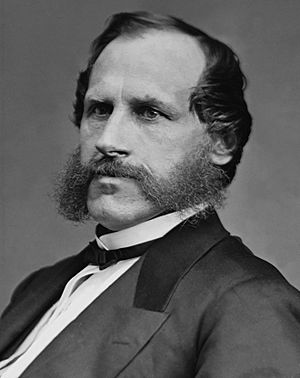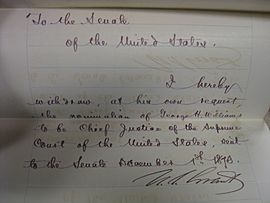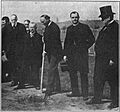George Henry Williams facts for kids
Quick facts for kids
George Williams
|
|
|---|---|
 |
|
| 34th Mayor of Portland | |
| In office June 2, 1902 – June 2, 1905 |
|
| Preceded by | Henry Rowe |
| Succeeded by | Harry Lane |
| 32nd United States Attorney General | |
| In office December 14, 1871 – April 25, 1875 |
|
| President | Ulysses Grant |
| Preceded by | Amos Akerman |
| Succeeded by | Edwards Pierrepont |
| United States Senator from Oregon |
|
| In office March 4, 1865 – March 3, 1871 |
|
| Preceded by | Benjamin Harding |
| Succeeded by | James Kelly |
| 3rd Chief Justice of the Oregon Supreme Court | |
| In office 1853–1858 |
|
| Appointed by | Franklin Pierce |
| Preceded by | Thomas Nelson |
| Succeeded by | Aaron Waite |
| Personal details | |
| Born | March 26, 1823 New Lebanon, New York, U.S. |
| Died | April 4, 1910 (aged 87) Portland, Oregon, U.S. |
| Political party | Democratic (Before 1864) Republican (1864–1910) |
| Spouses | Kate Van Antwerp Kate Hughes George |
| Signature | |
George Henry Williams (born March 26, 1823 – died April 4, 1910) was an important American judge and politician. He served as the chief justice of the Oregon Supreme Court and was the 32nd United States Attorney General. He was also elected as a U.S. Senator for Oregon.
As a U.S. Senator, Williams helped create laws that allowed the U.S. military to be used in the Reconstruction of the Southern states. This helped these states rejoin the United States in an organized way. He was the first person from the Pacific Coast to be appointed to a President's Cabinet.
As Attorney General under President Ulysses S. Grant, Williams continued to take legal action against the Ku Klux Klan, helping to stop their activities. He also dealt with tricky election arguments in the Southern states during Reconstruction. President Grant and Williams officially recognized P. B. S. Pinchback as the first African American state governor. Williams also made a ruling about the Virginius, a ship captured by Spain. He said the ship didn't have the right to fly the U.S. flag, but he also argued that Spain couldn't execute American crew members.
Williams was considered for the role of Chief Justice of the Supreme Court by President Grant, but he was not approved by the U.S. Senate. This was mainly due to some disagreements he had with another official in Oregon. In 1875, Williams resigned as U.S. Attorney General because of questions about his wife's financial dealings. After his resignation, Williams helped count ballots in Florida for Rutherford B. Hayes during the very close presidential election of 1876. Williams later returned to Oregon, worked as a lawyer, and was elected mayor of Portland. He served two terms from 1902 to 1905. Even at 83 years old, while he was mayor, Williams faced legal questions about enforcing certain laws, but he was found not guilty and finished his term.
Contents
Early Life and Law Career
George Henry Williams was born in New Lebanon, New York, on March 26, 1823. His family moved to Onondaga County, New York, when he was very young. He went to public and private schools, but he did not attend college. Williams studied law and became a lawyer in 1844 when he was 21.
That same year, Williams moved west to the Iowa Territory and started practicing law. After Iowa became a state, he was elected as a district judge in 1847 and served until 1852. In 1853, President Franklin Pierce appointed Williams as the Chief Justice of the Oregon Territory. In 1857, at the Oregon Constitutional Convention, Williams strongly argued that slavery should be illegal in Oregon before it became a state. He also tried, but failed, to make sure that a woman's property would not be taken to pay her husband's debts.
In the early days of the Oregon Supreme Court, the judges also traveled around to different areas to act as trial judges. While doing this, Williams oversaw the Holmes v. Ford case. In this case, he helped a slave family gain their freedom because slavery was illegal in the territory. He left the court in 1858 and moved to Portland, Oregon, where he continued to work as a lawyer.
Williams was a member of the Democratic Party and supported Stephen A. Douglas in the Presidential Election of 1860. In 1862, he attended the Oregon Union convention and was against slavery. He was also the chairman of the Election Committee there.
U.S. Senator
In 1864, Williams joined the Republican Party and was elected to the United States Senate. He served one term, from 1865 to 1871. In 1865, Senator Williams was appointed to important committees that dealt with money and public lands. He also joined the Joint Committee on Reconstruction.
In 1866, Williams wrote the Tenure of Office Act. This law, passed by Congress despite President Andrew Johnson's disagreement, limited the President's power to remove Cabinet members. This was important for the Republican Party at the time. In 1867, he also wrote and supported the Military Reconstruction Act. This act allowed the U.S. military to control the South. It helped the former Confederate states rejoin the United States in an organized and peaceful way. In 1868, Williams voted to find President Andrew Johnson guilty during his impeachment trial. Johnson was found not guilty by just one vote. Williams was not re-elected in 1870.
U.S. Attorney General
In December 1871, President Grant appointed Williams as the Attorney General of the United States. He served for three years until 1875. He was chosen to make sure that the Pacific Coast region had a representative in the President's Cabinet. Williams also worked as a lawyer for the Alaska Improvement Company, in which President Grant owned shares. President Grant's plan for Southern Reconstruction was mainly carried out through Williams's Justice Department.
Fighting the Klan
Attorney General Williams continued to take legal action against the Ku Klux Klan until December 1872. At that time, he announced a policy of forgiveness for the South. The Justice Department had too many cases against the Klan and not enough people to handle them all. Williams finished the remaining Klan cases in the spring of 1873. He believed that continuing to prosecute the Klan was no longer needed and was worried about how the public would react. Stopping the Klan helped African Americans vote in the South, which helped Grant get re-elected.
Touring the South (1872)
During the 1872 Presidential election, Attorney General Williams traveled through the Southern states. He gave speeches to support President Grant's Southern Reconstruction policy. He visited and spoke in major Southern cities like Richmond, Savannah, Georgia, and Charleston. Thanks to Williams's efforts, Southern states like Virginia, South Carolina, and Arkansas voted for the Republican Party. This was the last time Republicans won a majority in the South until much later.
Election Disputes
Williams also helped resolve election disputes in Southern states.
- Alabama election (1872): When election problems happened in Alabama in 1872, both the Democrats and Republicans asked Attorney General Williams for help. President Grant and Williams worked together to peacefully settle the disputed state elections. They issued five solutions to Governor David P. Lewis, which included having both Democratic and Republican representatives count disputed votes.
- Louisiana election (1872): In 1872, Louisiana was in political chaos, with two groups fighting for control of the state government. Both John D. McEnery (Democrat) and William P. Kellogg (Republican) claimed to have won the governorship, and both accused the other of voting fraud. Federal troops helped keep the peace. Attorney General Williams ruled that President Grant would support the decision of the U.S. District Courts. After a court decided that Kellogg was the winner, Attorney General Williams announced that President Grant recognized Kellogg as the rightful governor. He also recognized P. B. S. Pinchback as the first African American state governor.
The Virginius Affair (1873)
In October 1873, a ship called the Virginius, which was secretly owned by Cuban rebels, was captured by a Spanish warship. The ship was flying the American flag. In November, 53 crew members, including Americans and British sailors, were executed by Spanish forces in Cuba. On December 17, the Virginius was given to the United States Navy.
After an investigation, Attorney General Williams ruled that the Virginius had been bought illegally and did not have the right to fly the American flag. However, he argued that Spain did not have the right to capture the ship in open waters and execute American crew members. Through talks, 91 crew members were returned to New York. The families of the Americans who were executed later received $80,000 from Spain in 1875.
Chief Justice Nomination (1873)
In December 1873, President Grant nominated Williams to become the Chief Justice of the United States Supreme Court. However, rumors spread that Williams had used Justice Department money for his wife's expensive carriage. Williams had used government funds for personal checks when banks had problems during a financial crisis, but he did pay the money back. Because of these concerns, Williams's nomination was withdrawn by President Grant in January 1874.
Resignation (1875)
President Grant asked Williams to resign in April 1875. This was due to rumors that Williams's wife had accepted money in exchange for Williams dropping a legal case against a company. There were also questions about his wife's purchase of an expensive carriage using government money. Williams had also mixed his personal money with government funds, though he did pay it back. Williams resigned, and President Grant appointed Edwards Pierrepont as his replacement. Pierrepont worked to investigate and clean up the Justice Department.
Later Career
After resigning, Williams turned down an offer from President Grant to become the U.S. minister to Spain. George Williams supported Rutherford B. Hayes for President in 1876. During the very close 1876 Presidential Election, Williams, who was now a private citizen, went to Florida to help manage the ballot counting for Hayes.
After the 1876 election, Williams returned to his law practice in Portland. He supported suffrage (the right to vote) for women and the "popular government" movement in Oregon.
In 1895, Williams published a collection of his speeches called Occasional Addresses. These speeches were mostly about the history and growth of Portland, the study of medicine, and the U.S. Supreme Court. He also gave tributes to important figures like Generals U.S. Grant and W.T. Sherman.
Williams was elected mayor of Portland and served from 1902 to 1905. On January 4, 1905, when he was 83 years old, Mayor Williams was accused of not enforcing laws that regulated gambling. He was charged with not closing down gambling places in Portland. However, Williams was found not guilty and finished his term as mayor.
On May 28, 1905, Mayor Williams gave a speech at the opening of the Lewis and Clark Centennial Exposition. Vice President Charles W. Fairbanks was the main speaker. President Theodore Roosevelt officially opened the ceremony from Washington, D.C. by pressing a button.
Death and Burial
Williams died on April 4, 1910, in Portland. He is buried at River View Cemetery in that city.
Legacy
Williams was the first person from Oregon to be appointed to a President's Cabinet.
While Williams had some successes as U.S. Attorney General, he faced questions about his actions during his time in federal office. Some historians have been critical of his performance, especially regarding financial matters.
Family Life
Williams married Kate Van Antwerp in Iowa in 1850, and they had one daughter. He married a second time in 1867 to Kate Hughes George, and they adopted two children.
Images for kids
-
U.S. Joint High Commission in Washington, D.C.
Williams is in the center, standing.
Photo by Brady, 1871. -
Mayor Williams at the groundbreaking ceremony of the Lewis and Clark Centennial Exposition (1904). Williams is second from left, holding his hat.
 | Lonnie Johnson |
 | Granville Woods |
 | Lewis Howard Latimer |
 | James West |




